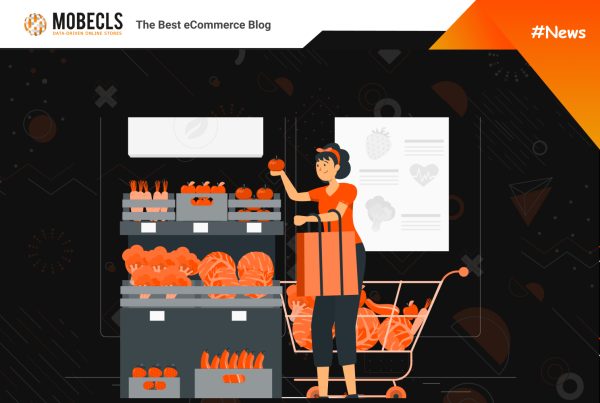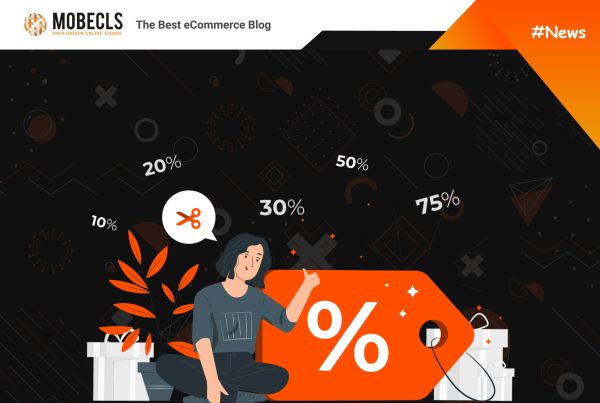Artificial intelligence (AI) has been a buzzword for quite some time, and its potential to revolutionize whole sectors is frequently depicted in near-mystical terms. Regardless of all the fuss, AI is undeniably a tremendous technological advancement.
AI-related technologies and techniques, such as machine learning and deep learning, have been leveraged to reach unthinkable aims and achievements.
The application of AI in eCommerce has been extremely active and inventive. Amazon was among the first to employ technology to cross-sell and upsell to their consumers, showcasing the immense ability of technology to increase revenue.
But in recent years, smaller companies and start-ups have also embraced the potential of AI to:
- improve their product offerings,
- better engage with customers,
- optimize their resources and,
- ultimately, to stand out in a highly competitive global marketplace.
In this article, we’ll take a look at some of the most useful ways eCommerce companies are using AI to boost their business and, in doing so, are transforming the way the industry operates as a whole.
AI Technologies in eCommerce
Personalization
Building trust, loyalty, and personal relationships with present and future consumers is an ongoing struggle for businesses of all kinds.
Unsurprisingly, this is one of the most heavily researched and tested sectors in eCommerce. AI personalization may take many different shapes. The technology provides customers with smooth and consistent omnichannel experiences across devices and platforms, with verbal and visual cues personalized to the individual customer based on their dynamic data profile.
Chatbots are another AI tool that has enabled online businesses to be available to their consumers 24/7. Individuals are increasingly eager to engage with them as they progress in order to get more knowledge or solve issues. Chatbots can now interpret voice interactions using natural language processing (NLP) and self-improve via self-learning processes thanks to AI. Chatbots may also leverage data that a company has acquired about a client to present them with targeted adverts and offers based on their purchase history or activity on a site.
Object Marketing
Creative tasks such as design and writing are now increasingly performed by AI. Software-as-a-service (SaaS) companies have used deep learning to begin solving some of the most complex systems in existence: human language and ideas of aesthetic beauty – and the result has been improved conversion and successful marketing campaigns.
This niche business idea was born out of the realization that email marketing remains a powerful and often overlooked tool – even though marketing emails are rarely opened, their mere presence in inboxes is enough to build a relationship with potential customers.
Enhanced Targeting
Digital marketers have used AI to enable businesses to create smart marketing campaigns. AI-powered software tracks user behavior to develop automated target markets in customer relationship management (CRM) systems.
This process is particularly relevant for B2B businesses, which can use the software to scour websites for companies that might be interested in the products they sell. Similarly, social media platforms like Facebook and Instagram have used AI to refine how well their paid ads target users based on their profiles.
AI gives small businesses an incredibly powerful set of tools to reach a pre-screened, potentially global customer base, reducing the need for mass outreach and costly advertising campaigns.
Product Recommendations
Product recommendations are one of the most powerful ways to use AI to increase eCommerce sales. Anyone who has ever purchased an item on Amazon knows how it works in practice. When you look at a product, a selection of similar or related products is also presented somewhere on the screen. Cross-selling and up-selling would account for 35% of Amazon’s revenue.
Social media companies have also been at the forefront of AI-powered product recommendations, thanks to the vast amounts of data they collect about user activity, from images viewed the longest, types of pages visited or clicks on any page elements.
As this technology becomes increasingly sophisticated, expect product recommendations not only to be based on purchase history or the pages you’ve viewed online but to be fine-tuned to trigger complex emotional reactions that will make you make a purchase.
Bottom Line
All in all, AI allows humans to envision a new method of defining and achieving goals in all industries. As AI technology improves and perfects, digital marketers will continue to develop new and unique methods to utilize technology in eCommerce, increasing the income of online enterprises.
![]() Mobecls team offers fixed-price service packages for Magento store support. Moreover, we’ll help you to choose a plan according to your business needs and specifics. A service package may include updates, the installation of modules, bug fixing, SEO support and many more. Contact us and we’ll help you.
Mobecls team offers fixed-price service packages for Magento store support. Moreover, we’ll help you to choose a plan according to your business needs and specifics. A service package may include updates, the installation of modules, bug fixing, SEO support and many more. Contact us and we’ll help you.




